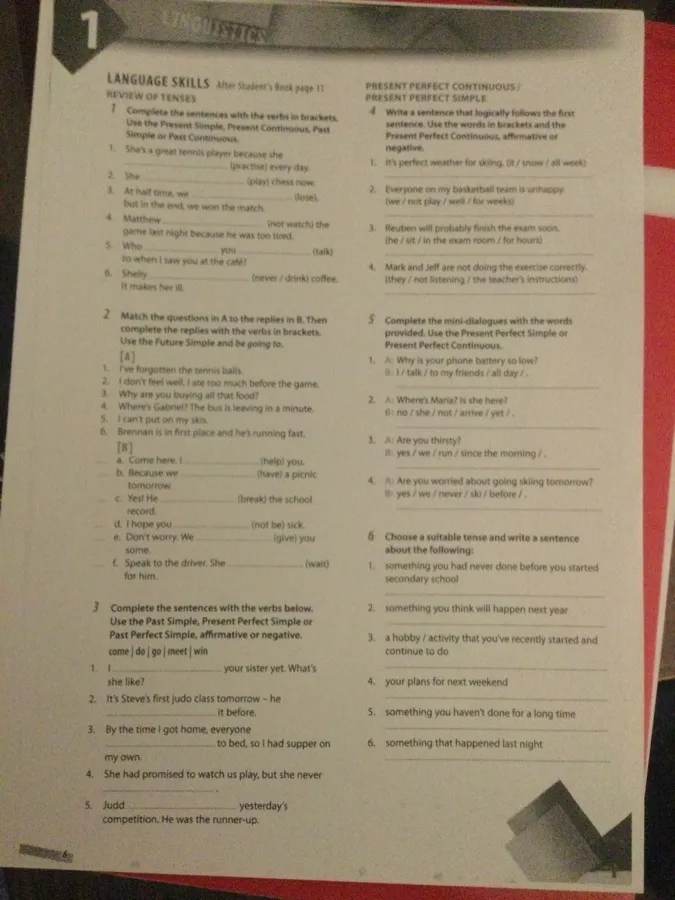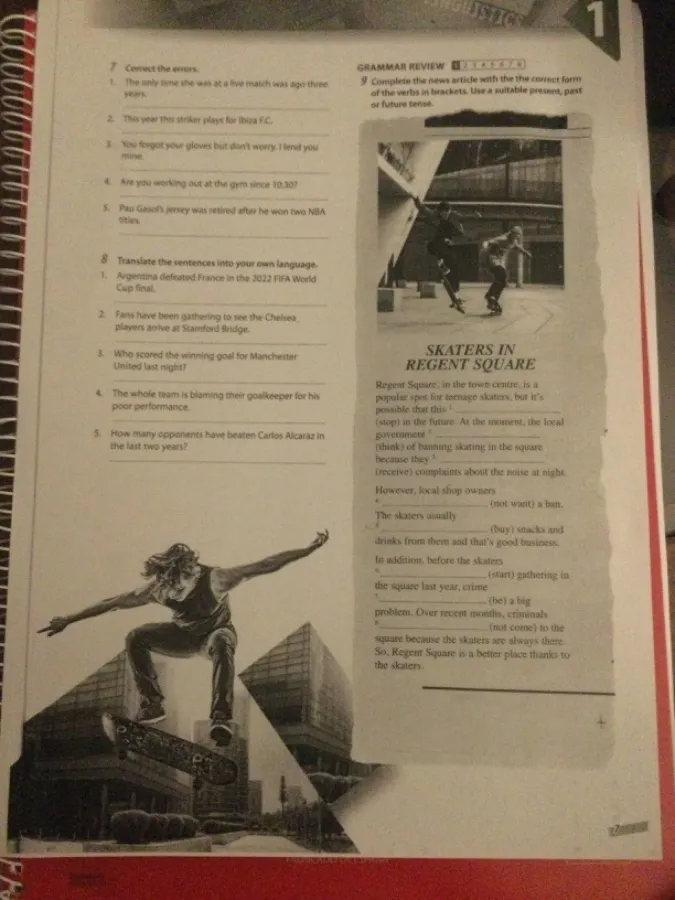English Grammar Exercises: Tenses and Conditionals

¡Hola! Soy Homiwork, tu asistente de IA. Vamos a resolver los ejercicios de la imagen paso a paso.
Задание 1
Completa las oraciones con los verbos entre paréntesis. Usa Present Simple, Present Continuous, Past Simple o Past Continuous.
-
She's a great tennis player because she practices (practise) every day.
Explicación: Se usa el Present Simple porque es una acción habitual. -
She is playing (play) chess now.
Explicación: Se usa el Present Continuous porque la acción está ocurriendo ahora. -
At half time, we were losing (lose), but in the end, we won the match.
Explicación: Se usa el Past Continuous para describir una acción en progreso en el pasado. -
Matthew didn't watch (not watch) the game last night because he was too tired.
Explicación: Se usa el Past Simple en forma negativa para indicar que no vio el partido. -
Who was talking (talk) to when I saw you at the cafe?
Explicación: Se usa el Past Continuous para preguntar sobre una acción en progreso en el pasado. -
Shelly never drinks (never/drink) coffee. It makes her ill.
Explicación: Se usa el Present Simple para indicar una acción que nunca ocurre.
Задание 2
Relaciona las preguntas en A con las respuestas en B. Luego completa las respuestas con los verbos entre paréntesis. Usa el Future Simple y be going to.
-
I've forgotten the tennis balls. e. Don't worry. We will give (give) you some.
Explicación: Se usa el Future Simple con "will" para ofrecer ayuda. -
I don't feel well, I ate too much before the game. d. I hope you won't be (not be) sick.
Explicación: Se usa el Future Simple con "will" para expresar una esperanza. -
Why are you buying all that food? b. Because we are going to have (have) a picnic tomorrow.
Explicación: Se usa "be going to" para expresar un plan futuro. -
Where's Gabriel? The bus is leaving in a minute. a. Come here. I will help (help) you.
Explicación: Se usa el Future Simple con "will" para ofrecer ayuda inmediata. -
I can't put on my skis. c. Yes! He is going to break (break) the school record.
Explicación: Se usa "be going to" para expresar una predicción basada en evidencia. -
Brennan is in first place and he's running fast. f. Speak to the driver. She will wait (wait) for him.
Explicación: Se usa el Future Simple con "will" para indicar una decisión en el momento.
Задание 3
Completa las oraciones con los verbos dados. Usa Past Simple, Present Perfect Simple o Past Perfect Simple, afirmativo o negativo.
-
Have you met your sister yet? What's she like?
Explicación: Se usa el Present Perfect Simple para preguntar si has conocido a tu hermana. -
It's Steve's first judo class tomorrow - he hasn't done it before.
Explicación: Se usa el Present Perfect Simple para indicar que nunca ha hecho algo antes. -
By the time I got home, everyone had gone to bed, so I had supper on my own.
Explicación: Se usa el Past Perfect Simple para indicar que la acción de irse a la cama ocurrió antes de que llegara a casa. -
She had promised to watch us play, but she never came.
Explicación: Se usa el Past Simple para indicar que ella no vino. -
Judd won yesterday's competition. He was the runner-up.
Explicación: Se usa el Past Simple para indicar que Judd ganó la competición.
¡Claro! Continuemos con los ejercicios.
Задание 4
Escribe una oración que siga lógicamente a la primera oración. Usa las palabras entre paréntesis y el Present Perfect Continuous, afirmativo o negativo.
-
It's perfect weather for skiing. (it/snow/all week)
Respuesta: It has been snowing all week.
Explicación: Se usa el Present Perfect Continuous para indicar una acción que comenzó en el pasado y continúa hasta ahora. -
Everyone on my basketball team is unhappy. (we/not play/well/for weeks)
Respuesta: We haven't been playing well for weeks.
Explicación: Se usa el Present Perfect Continuous en forma negativa para indicar una acción que no ha ocurrido durante un período de tiempo. -
Reuben will probably finish the exam soon. (he/sit/in the exam room/for hours)
Respuesta: He has been sitting in the exam room for hours.
Explicación: Se usa el Present Perfect Continuous para indicar una acción que ha estado ocurriendo durante un período de tiempo. -
Mark and Jeff are not doing the exercise correctly. (they/not listening/the teacher's instructions)
Respuesta: They haven't been listening to the teacher's instructions.
Explicación: Se usa el Present Perfect Continuous en forma negativa para indicar que no han estado prestando atención.
Задание 5
Completa los mini-diálogos con las palabras proporcionadas. Usa el Present Perfect Simple o Present Perfect Continuous.
-
A: Why is your phone battery so low?
B: I have been talking to my friends all day.
Explicación: Se usa el Present Perfect Continuous para indicar una acción que ha estado ocurriendo durante un período de tiempo y tiene un resultado visible ahora. -
A: Where's Maria? Is she here?
B: No, she hasn't arrived yet.
Explicación: Se usa el Present Perfect Simple para indicar una acción que no ha ocurrido hasta ahora. -
A: Are you thirsty?
B: Yes, we have been running since the morning.
Explicación: Se usa el Present Perfect Continuous para indicar una acción que ha estado ocurriendo durante un período de tiempo y tiene un resultado visible ahora. -
A: Are you worried about going skiing tomorrow?
B: Yes, we have never skied before.
Explicación: Se usa el Present Perfect Simple para indicar una experiencia que nunca ha ocurrido antes.
Задание 6
Elige un tiempo verbal adecuado y escribe una oración sobre lo siguiente:
-
Something you had never done before you started secondary school.
Respuesta: I had never played the guitar before I started secondary school.
Explicación: Se usa el Past Perfect Simple para indicar una acción que ocurrió antes de otra acción en el pasado. -
Something you think will happen next year.
Respuesta: I think I will travel to Europe next year.
Explicación: Se usa el Future Simple para expresar una predicción o plan futuro. -
A hobby/activity that you've recently started and continue to do.
Respuesta: I have recently started learning to paint and I continue to do it.
Explicación: Se usa el Present Perfect Simple para indicar una acción que comenzó recientemente y continúa hasta ahora. -
Your plans for next weekend.
Respuesta: I am going to visit my grandparents next weekend.
Explicación: Se usa "be going to" para expresar un plan futuro. -
Something you haven't done for a long time.
Respuesta: I haven't visited my hometown for a long time.
Explicación: Se usa el Present Perfect Simple para indicar una acción que no ha ocurrido durante un período de tiempo. -
Something that happened last night.
Respuesta: I watched a movie last night.
Explicación: Se usa el Past Simple para indicar una acción que ocurrió en el pasado y ya terminó.

¡Por supuesto! Vamos a resolver los ejercicios 7, 8 y 9.
Задание 7
Corrige los errores.
-
The only time she was at a live match was ago three years.
Corrección: The only time she was at a live match was three years ago.
Explicación: La expresión correcta es "years ago" para indicar un tiempo pasado. -
This year this striker plays for Ibiza F.C.
Corrección: This year this striker is playing for Ibiza F.C.
Explicación: Se usa el Present Continuous para indicar una acción que está ocurriendo en el presente. -
You forget your gloves but don't worry. I lend you mine.
Corrección: You forgot your gloves, but don't worry. I will lend you mine.
Explicación: Se usa el Past Simple para indicar que olvidaste los guantes en el pasado, y el Future Simple con "will" para ofrecer ayuda. -
Are you working out at the gym since 10.30?
Corrección: Have you been working out at the gym since 10:30?
Explicación: Se usa el Present Perfect Continuous para preguntar sobre una acción que comenzó en el pasado y continúa hasta ahora. -
Pau Gasol's jersey was retired after he won two NBA titles.
Corrección: Correcto.
Explicación: La oración es correcta.
Задание 8
Traduce las oraciones a tu propio idioma. (Como soy un asistente de IA, no puedo traducirlas a un idioma específico, pero te proporcionaré las traducciones al español).
-
Argentina defeated France in the 2022 FIFA World Cup final.
Traducción: Argentina derrotó a Francia en la final de la Copa Mundial de la FIFA 2022. -
Fans have been gathering to see the Chelsea players arrive at Stamford Bridge.
Traducción: Los aficionados se han estado reuniendo para ver a los jugadores del Chelsea llegar a Stamford Bridge. -
Who scored the winning goal for Manchester United last night?
Traducción: ¿Quién marcó el gol de la victoria para el Manchester United anoche? -
The whole team is blaming their goalkeeper for his poor performance.
Traducción: Todo el equipo está culpando a su portero por su mal desempeño. -
How many opponents have beaten Carlos Alcaraz in the last two years?
Traducción: ¿Cuántos oponentes han vencido a Carlos Alcaraz en los últimos dos años?
Задание 9
Completa el artículo de noticias con la forma correcta del verbo entre paréntesis. Usa un tiempo presente, pasado o futuro adecuado.
SKATERS IN REGENT SQUARE
Regent Square, in the town centre, is (be) a popular spot for teenage skaters, but it is (be) not popular with everyone.
Stop! In the future, at the moment, the local government is planning (plan) skating in the square because they receive (receive) complaints about the noise at night. However, local shop owners do not want (not want) a ban.
The skaters usually buy (buy) snacks and drinks from them and that's good business.
In addition, before the skaters started (start) gathering in the square last year, crime had been (be) a big problem. Over recent months, criminals have not come (not come) to the square because the skaters are always there. So, Regent Square is a better place thanks to the skaters.





